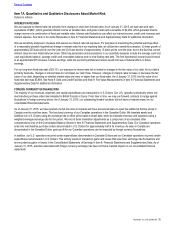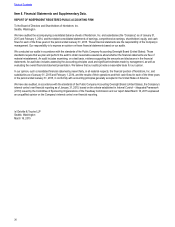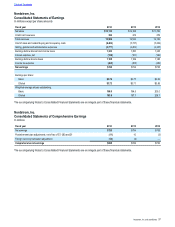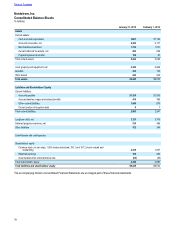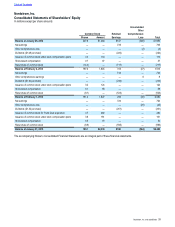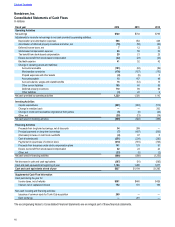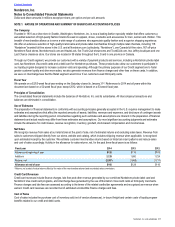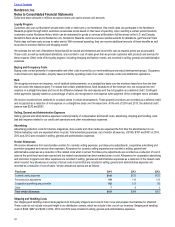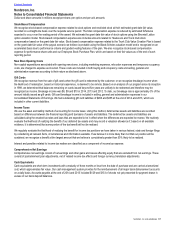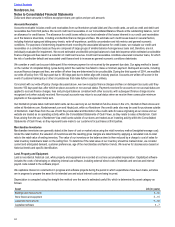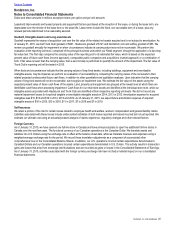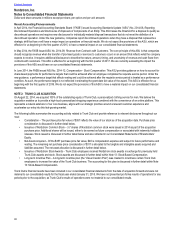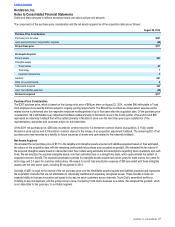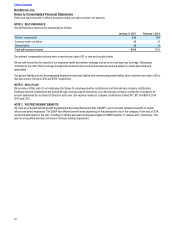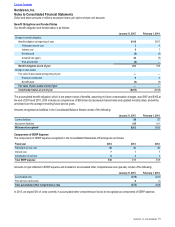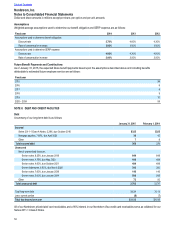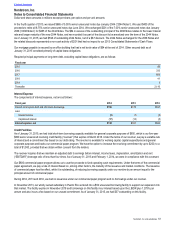Nordstrom 2014 Annual Report Download - page 45
Download and view the complete annual report
Please find page 45 of the 2014 Nordstrom annual report below. You can navigate through the pages in the report by either clicking on the pages listed below, or by using the keyword search tool below to find specific information within the annual report.
Table of Contents
Nordstrom, Inc.
Notes to Consolidated Financial Statements
Dollar and share amounts in millions except per share, per option and per unit amounts
Nordstrom, Inc. and subsidiaries 45
Leasehold improvements and leased property and equipment that are purchased at the inception of the lease, or during the lease term, are
depreciated over the shorter of the lease term or the asset life. Lease terms include the fixed, non-cancelable term of a lease, plus any
renewal periods determined to be reasonably assured.
Goodwill, Intangible Assets and Long-Lived Assets
Goodwill represents the excess of acquisition cost over the fair value of the related net assets acquired and is not subject to amortization. As
of January 31, 2015, we had Trunk Club goodwill of $261, HauteLook goodwill of $121 and Nordstrom.com and Jeffrey goodwill of $53. We
review our goodwill annually for impairment or when circumstances indicate its carrying value may not be recoverable. We perform this
evaluation at the reporting unit level, comprised of the principal business units within our Retail segment, through the application of a two-step
fair value test. The first step compares the carrying value of the reporting unit to its estimated fair value, which is based on the expected
present value of future cash flows (income approach), comparable public companies and acquisitions (market approach) or a combination of
both. If fair value is lower than the carrying value, then a second step is performed to quantify the amount of the impairment. The fair value of
Trunk Club’s reporting unit will be tested in 2015.
When facts and circumstances indicate that the carrying values of long-lived assets, including buildings, equipment and amortizable
intangible assets, may be impaired, we perform an evaluation of recoverability by comparing the carrying values of the net assets to their
related projected undiscounted future cash flows, in addition to other quantitative and qualitative analyses. Upon indication that the carrying
values of long-lived assets will not be recoverable, we recognize an impairment loss. We estimate the fair value of the assets using the
expected present value of future cash flows of the assets. Land, property and equipment are grouped at the lowest level at which there are
identifiable cash flows when assessing impairment. Cash flows for our retail store assets are identified at the individual store level, while our
intangible assets associated with HauteLook and Trunk Club are identified at their respective reporting unit levels. We did not record any
material impairment losses for long-lived tangible or amortizable intangible assets in 2014, 2013 or 2012. Amortization expense for acquired
intangibles was $10, $10 and $19 in 2014, 2013 and 2012. As of January 31, 2015, we expect future amortization expense of acquired
intangible assets of $16 in 2015, $15 in 2016, $11 in 2017, $7 in 2018 and $7 in 2019.
Self-Insurance
We retain a portion of the risk for certain losses related to employee health and welfare, workers’ compensation and general liability claims.
Liabilities associated with these losses include undiscounted estimates of both losses reported and losses incurred but not yet reported. We
estimate our ultimate cost using an actuarially-based analysis of claims experience, regulatory changes and other relevant factors.
Foreign Currency
As of January 31, 2015, we have opened one full-line store in Canada and have announced plans to open five additional full-line stores in
Canada over the next few years. The functional currency of our Canadian operations is the Canadian Dollar. We translate assets and
liabilities into U.S. Dollars using the exchange rate in effect at the balance sheet date, while we translate revenues and expenses using a
weighted-average exchange rate for the period. We record these translation adjustments as a component of accumulated other
comprehensive loss on the Consolidated Balance Sheets. In addition, our U.S. operations incurred certain expenditures denominated in
Canadian Dollars and our Canadian operations incurred certain expenditures denominated in U.S. Dollars. This activity results in transaction
gains and losses that arise from exchange rate fluctuations and are recorded as gains or losses in the Consolidated Statements of Earnings.
As of January 31, 2015, activities associated with the foreign currency exchange risk have not had a material impact on our consolidated
financial statements.


